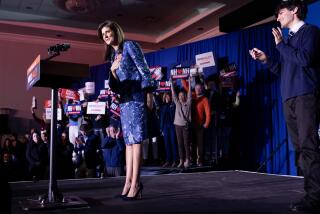New Hampshire, 1968
- Share via
New Hampshire has voted for a future winner in every primary since 1952, save for two contests (1992 and 2000, if you’re keeping track). So 1968 should have been unremarkable; Granite State voters did choose future winner and two-time Times endorsee Richard Nixon. But Sen. Eugene J. McCarthy’s (D-Minn.) near-defeat of a sitting president by running an antiwar platform this only shortly after a decisive moment in Vietnam made the primary a memorable one. Within days, Sen. Robert F. Kennedy announced he was entering the race on a peace platform, and Lyndon Johnson said he would not seek reelection. Below, The Times’ editorial reaction, printed March 15, 1968.
Widening the ’68 Contest
The frigid climate of New Hampshire this week was coldest of all to the political calculations of the deeply troubled man in the White House. Although winning his write-in effort by a narrow margin, President Johnson took an unmerciful psychological defeat at the hands of Sen. Eugene J. McCarthy (D-Minn.), his scholarly challenger.
Not unexpectedly, New Hampshire’s coldness also generated some hard new looks at the unprecedented prospect of unseating an incumbent Chief Executive at his party’s national convention.
Sen. Robert F. Kennedy (D-N.Y.), like McCarthy, a spokesman for the “peace wing” of the Democratic Party, is giving every indication that he will now enter the fray. Naturally McCarthy’s aides are crying “opportunism,” and McCarthy himself declares he’s in the race to stay.
Regardless, it seems to us that the American people stand to gain by a widening of the list of avowed candidates in both the Democratic and Republican parties.
Monologues are rarely conducive to public understanding of great issues. Articulate as he is, former vice President Richard M. Nixon will surely sharpen his viewpoints if he is confronted with a challenge from New York’s Gov. Nelson A. Rockefeller.
On the Democratic side, a freak colloquy involving Kennedy and McCarthy may elicit the positive pronouncements on methods of stopping the Vietnam war which have thus far been lacking ..
There are other monumental problems plaguing our country which must be discussed: the agony of the cities, the imbalance of opportunity that spawns racial violence, our vulnerable economy.
Platitudes aren’t enough. At this time in history, the people must know exactly how the next leader of the greatest nation on earth intends to deal with these interlocking crises.
Those who suggest that a further challenge to Mr. Johnson would “split” the Democratic Party speak nonsense. So does anybody who thinks that vigorous debate among Republican hopefuls would jeopardize GOP “unity.” Major parties have always been split, to a greater or lesser degree, before their nominee is chosen, and sometimes afterwards, too. That is the nature of the game. It is a healthy thing. Monoliths have no place in U.S. politics.
In the interests of an intelligent preconvention discourse, The Times urges Messrs. Kennedy and Rockefeller to make their moves now.
More to Read
Get the L.A. Times Politics newsletter
Deeply reported insights into legislation, politics and policy from Sacramento, Washington and beyond. In your inbox twice per week.
You may occasionally receive promotional content from the Los Angeles Times.










